The Camp Fire’s Forgotten Communities
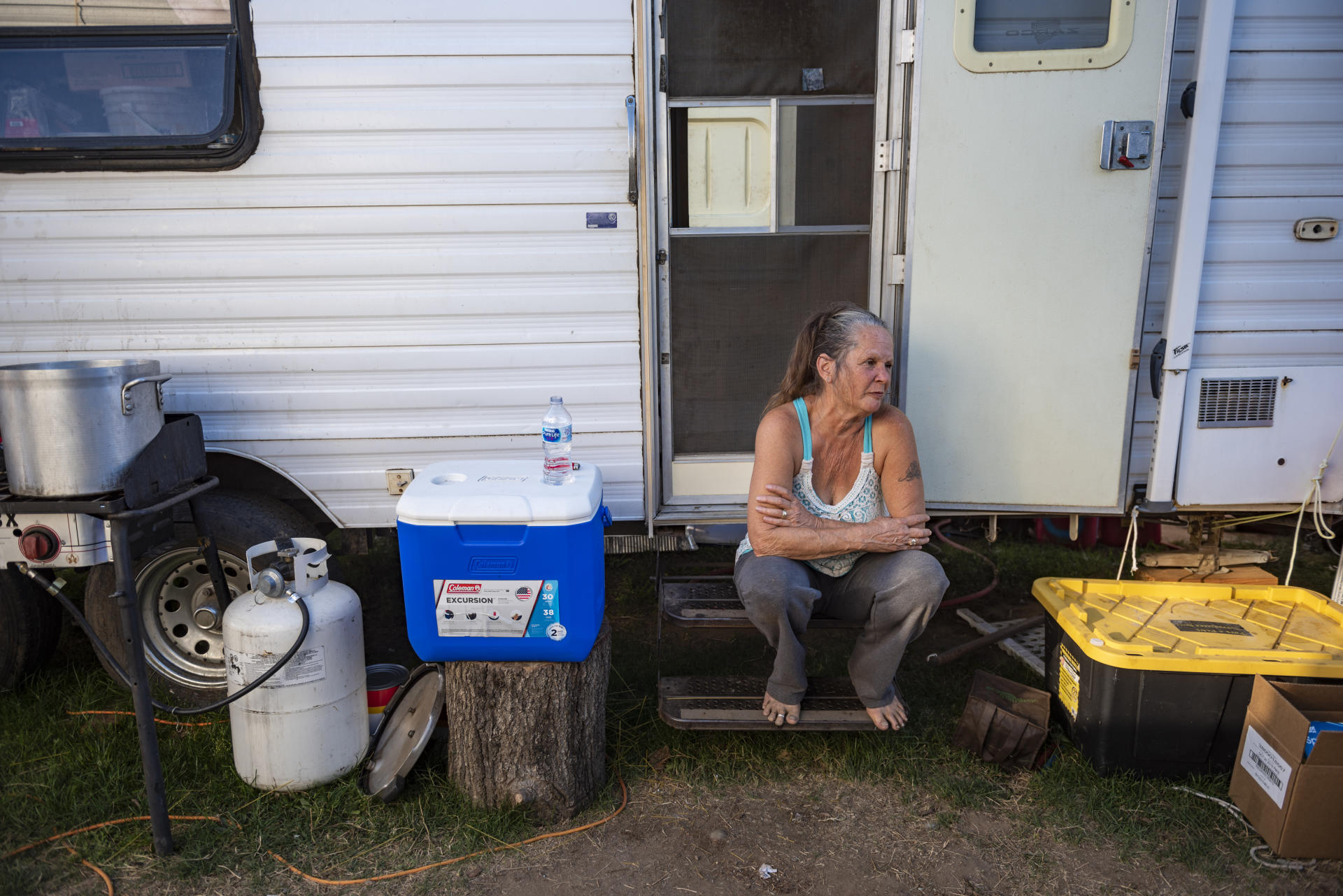
Teri Rubiolo (center) sits outside her kitchen trailer where she works to serve residents of the Concow area gather for a meal and supplies at the property of Rubiolo, who has become a mother figure to the community on Monday, October 21, 2019 in Concow, Calif. As a result of the 2018 Camp Fire, the town of Paradise and neighboring communities has been demolished and the community has been dispersed throughout the North State region, California and the nation. For the purposes of documenting the Camp Fire from the perspectives of the individuals who experienced the natural disaster, the Camp Fire Oral History Project (CFOHP) will capture and preserve the voices of survivors affected by the November 2018 disaster. The CFOHP will gather the stories of those directly impacted by the disaster, evacuees and first responders, together in a central location. (Jason Halley/University Photographer/CSU, Chico)
Editor’s Note: As we approach the one-year anniversary of the Camp Fire, we are honoring its impact on our community with a series of stories embracing the themes of remembrance, recovery, and resurgence.
On a gravel road off a winding drive is Teri and John Rubiolo’s Concow property. Their 10 acres are nestled inside this scenic canyon, among stately pine trees and gurgles from a nearby creek. John’s white truck is parked on an elevated slab—the spot where the Rubiolos’ house stood before the Camp Fire destroyed it and nearly every home in the vicinity.
Evening is a busy time here. In one of the Rubiolos’ three trailers—two of which were donated—Teri stores food and ingredients for home-cooked meals, which she prepares in a second trailer for mountain residents who need one. Among the constant rumble of three generators, clucking chickens, and a pair of snorting pigs, some neighbors visit and find a place to sit and eat. Others take the meals home in donated to-go boxes. John also makes daily deliveries throughout Butte County—Magalia, Oroville, Gridley—and friends load up their vehicles to assist with dozens of stops.
Teri was making meals for three years before the Camp Fire took down this close-knit community and scattered many of its residents to others’ homes, travel trailers, and FEMA housing. But her selfless acts of service are more impactful today than ever. In total, Teri estimates she prepares up to 450 meals a week.
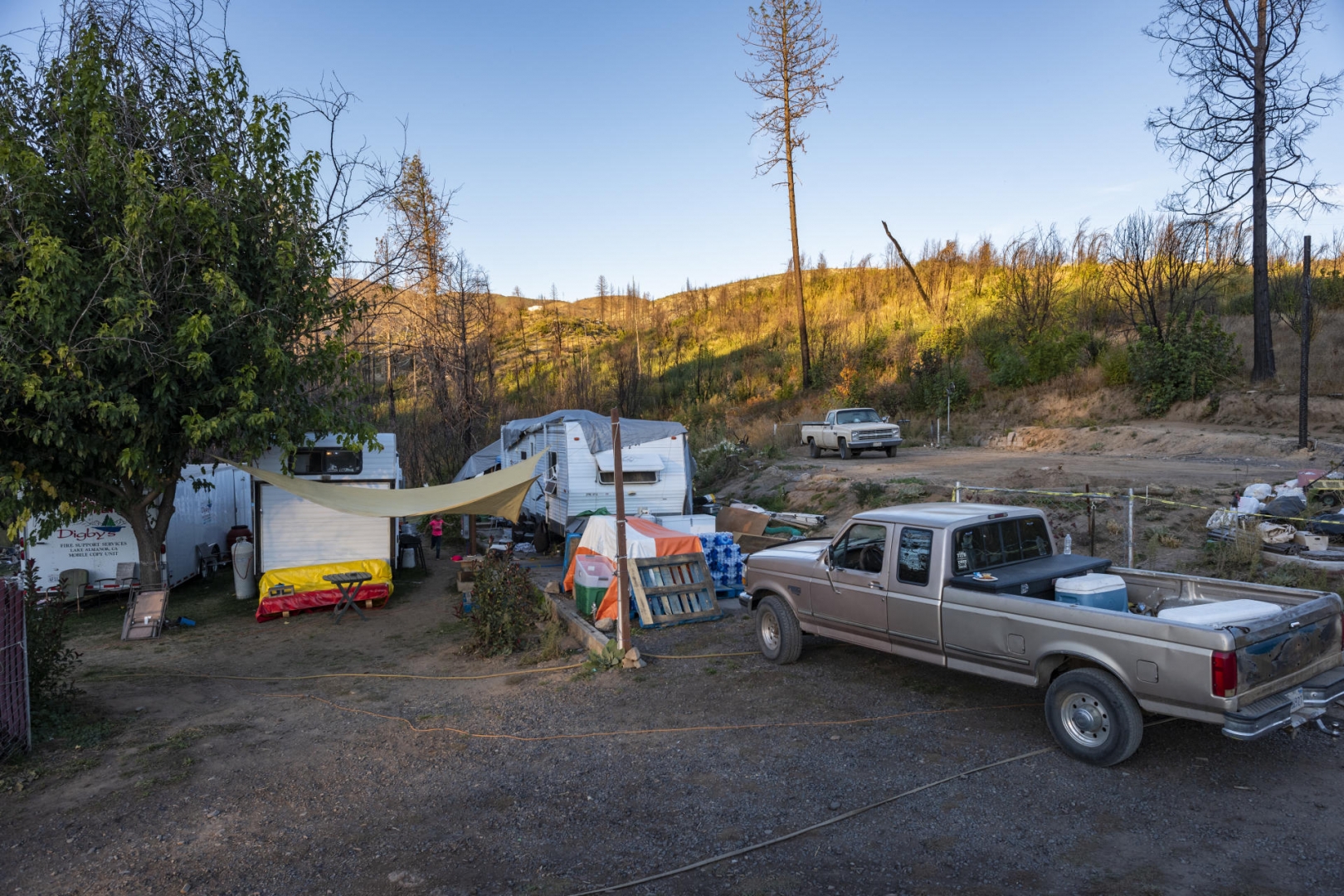
Ask anyone on the mountain, and they’ll tell you she is the glue that holds this community together. That’s what Marianne Paiva—faculty in the Departments of Sociology and Multicultural and Gender Studies at Chico State—heard time and again as she met residents and conducted interviews for Chico State’s Camp Fire Oral History Project—an ambitious University documentation of lives impacted by the Camp Fire.
In nearly 120 interviews totaling more than 1,000 hours between April 1 and August 1, Paiva, North State Public Radio (NSPR) news director Sarah Bohannon, and Meriam Library archivist Stephanie Baldivia heard stories of harrowing escape, unimaginable loss, deep gratitude, and optimistic hope.
It seems, in sharing their experiences, a burden is lifted, Paiva said.
“Trauma came in many different forms, and no two traumas were the same,” she said. “It gave me a whole new understanding of what trauma is and how it affects people. That was incredibly powerful.”
While the Camp Fire Oral History Project recordings continue to be transcribed and synced with the audio, indexed, and published to CSU, Chico Digital Collections, Baldivia expects the repository of stories to be released to the public early next year.
Paiva (Sociology, ’99; MA, Social Science, ’01) said once the project’s idea coalesced, she quickly recognized the very real obligation—and privilege—to this personal and intimate type of research.
“You’re asking people to relive things that are probably the worst days in their lives,” she said. “You’re asking them to reveal their fears. And I wanted to respect that.”
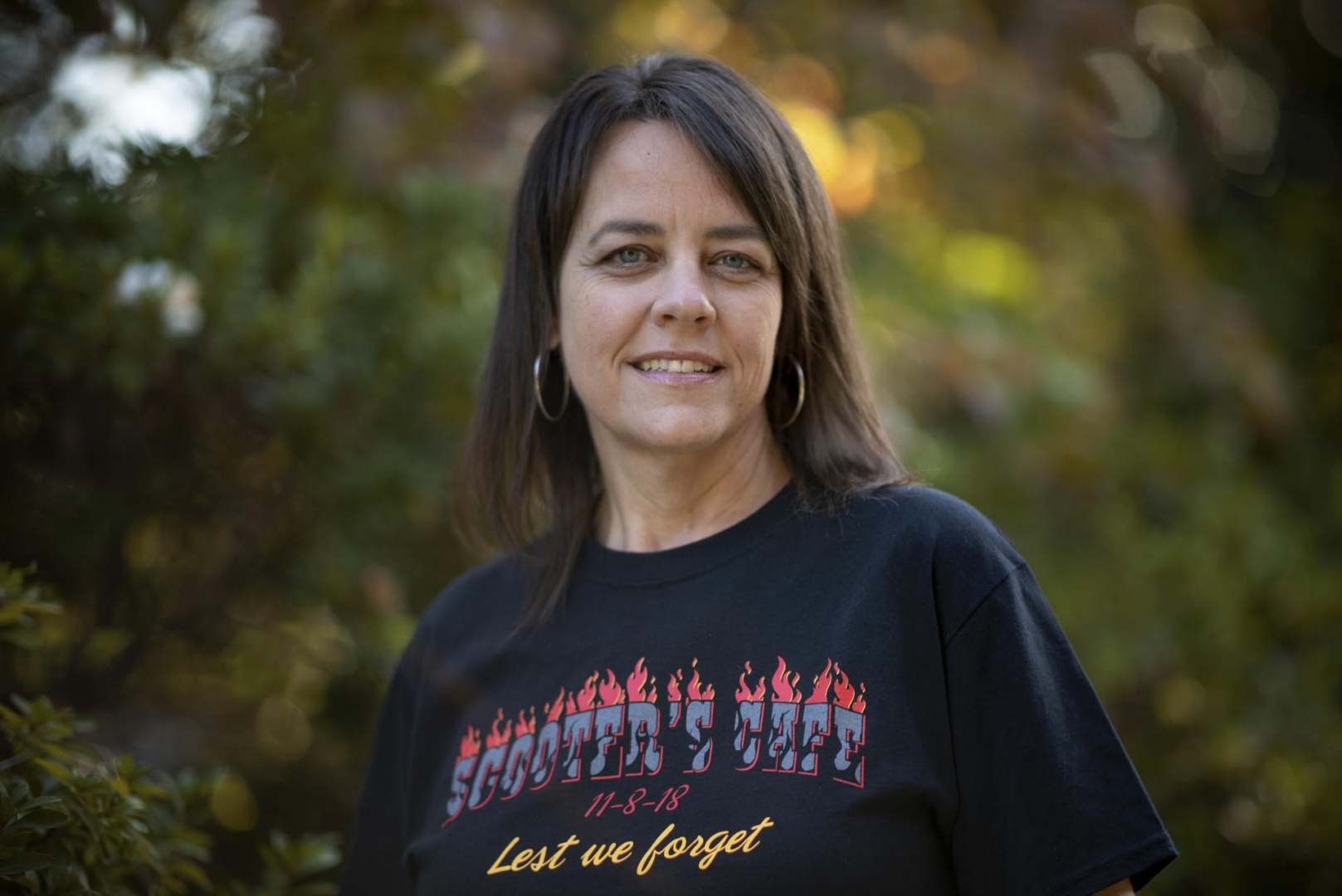
No matter where residents lived at the moment the Camp Fire erupted—from Paradise, Magalia, and Butte Creek Canyon to Pulga, Concow, and Yankee Hill—they all had a story to tell. And as the recordings stacked up like the burnt and discarded logs left behind by the fire, Paiva noticed a pattern. While Paradise had been receiving attention, services, and resources to clean up and rebuild, more rural communities just a few miles to the east were being forgotten.
Quite often, people live in communities like Concow because they value their independence and seclusion. As a sociologist, Paiva was fascinated with the way the network operated. Trust is social currency on the mountain, and she knew it would be challenging to meet its residents.
“I had to build relationships to get the stories that I needed from people,” she said, “because they never would’ve talked to me otherwise.”
To begin making inroads, Paiva often traveled to Concow just to be seen. Eating lunch at Scooter’s Café, stopping for an iced tea at Canyon Lakes Market, and making good on a commitment to attend a pancake breakfast, she met residents who were as curious about her as she was about them. The ensuing relationships had a ripple effect.
“As soon as you know someone and they trust you,” she said, “then they all trust you.”
As Paiva met more residents, she conducted some interviews in the NSPR studios. But many others took place on the mountain. She spent hours chatting on porches, inside trailers, and even on the back of a quad as it snaked through dirt roads—all to listen to and document personal stories of those who experienced unspeakable loss.
Time after time, Paiva was told that if she wanted to truly understand Concow, she had to meet Teri. She knew she must.
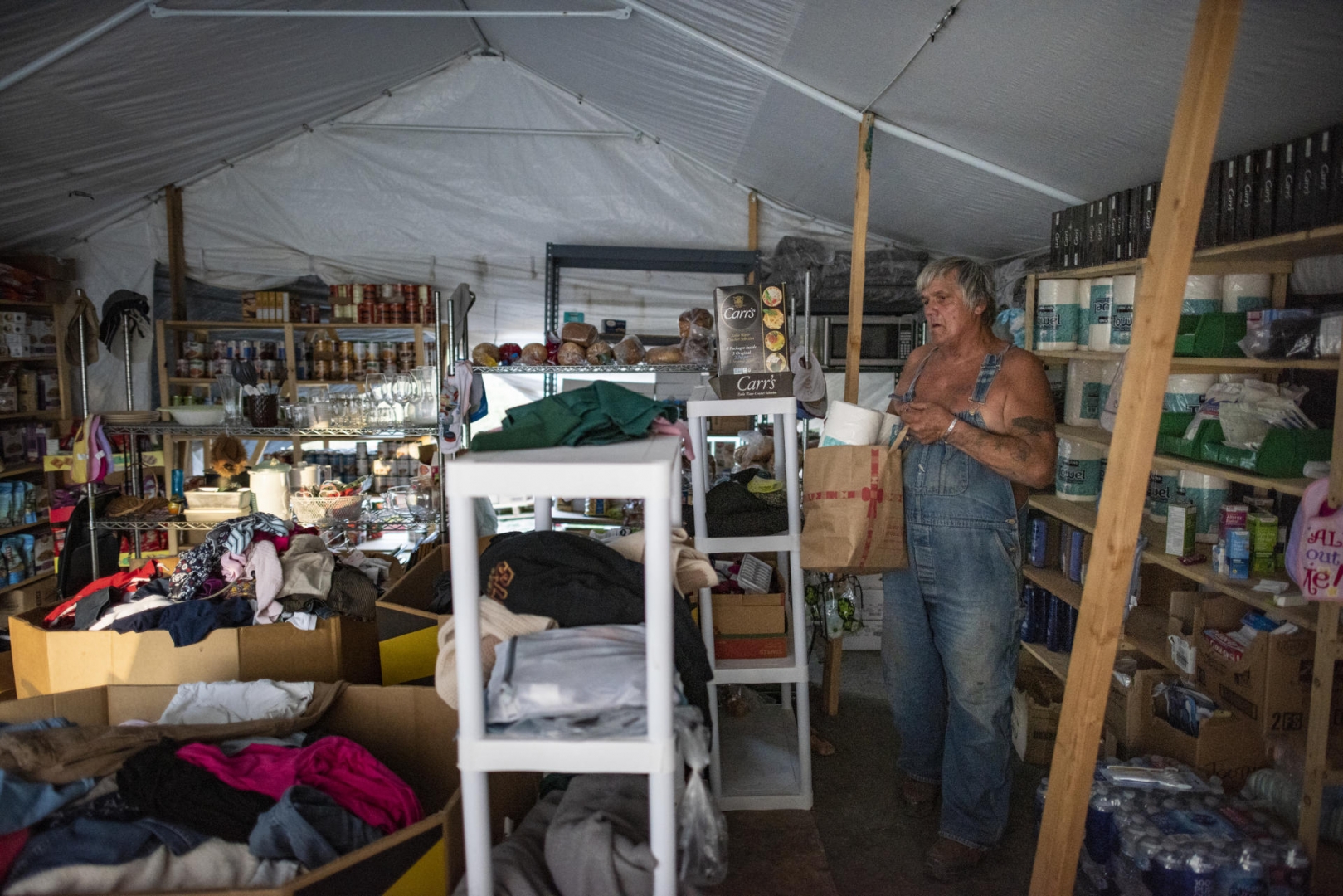
In addition to the weekly meal preparation, the Rubiolos’ property doubles as a de facto distribution center. People come and go day and night for a few protein bars, new towels, or a bag of fresh fruit. Tents and yurts are lined with shelves and boxes of food, clothes, and kitchen essentials. From cereal, bread, and shampoo to toiletries, diapers, and hygiene products, the Rubiolos ensure their community is taken care of.
A washer and dryer sit beneath a tarp for people to do laundry. An outdoor shower offers relief. And pumpkins are set out for the taking so the community can celebrate the spirit of fall.
Teri stocks the shelves through corporate donations, food banks, and private giving. And if someone needs something she doesn’t have, she finds a source.
No matter how long recovery on the mountain takes, Paiva, Bohannon, Baldivia, and its residents want to make sure they—and their needs and resilience—are not forgotten.
“I connect the dots,” said Teri, who also offers phone charging stations and free Wi-Fi.
Keeping this system running is an expensive enterprise, however. To keep perishables fresh, to power electronics, and to fuel their own home, Teri and John spend anywhere from $1,500 to $2,000 a month in gasoline—because their property along with much of Concow remains without power since the Camp Fire.
“There are people who are still struggling, there are people who are not using their heaters in their trailers because they don’t have enough money to pay for their propane bill,” Paiva said. “There are people who wouldn’t be eating if it were not for donations from Teri and others.”
There have always been disparities between the rural mountain community and its once-densely populated neighbor less than 10 forested miles away. But those differences have never been more apparent than since November 8, 2018.
Today in Paradise, businesses have re-opened, housing permits are issued to greenlight rebuilding, and waste is hauled away by the truckload on a daily basis.
Meanwhile, it’s quiet over the ridge in Concow, where wrought-iron gates guard empty lots; houses and kitchens are replaced by camping tents and charcoal barbecues; and logs and lumber lie in wait, stacked and left behind in empty driveways. As much as 90 percent of the homes occupied by its 710 residents were destroyed by the fire.
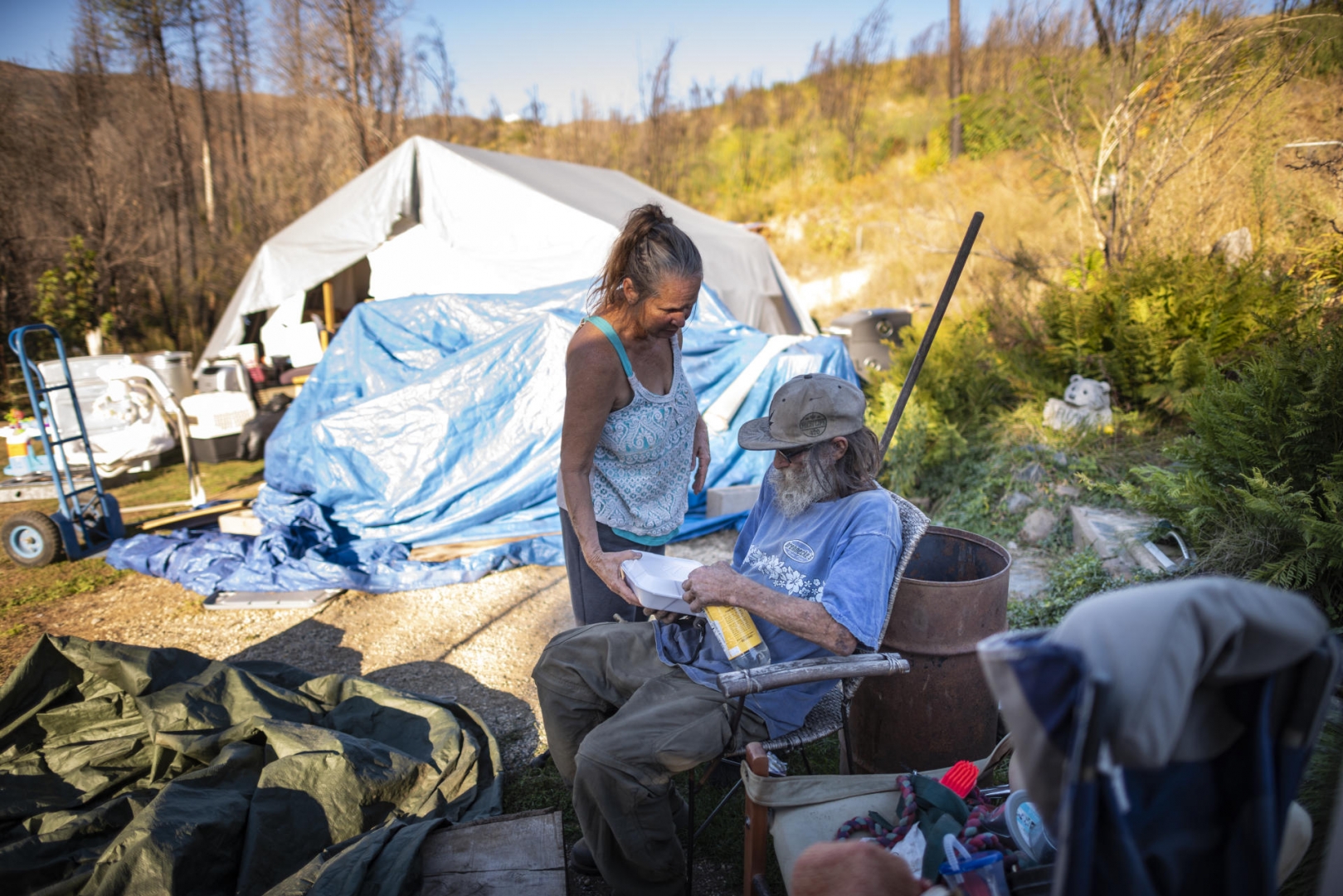
“Some places are getting cleaned up, but basic day-to-day life is the same. Basically, we’re homeless,” Teri said in her oral history interview with Bohannon (Journalism, ’13).
The Rubiolos show no sign of slowing down—because their community needs them. And they find gratitude in what they do have.
“This was a place of peace even before the fire,” said Teri, who, every once in a while, opens the door of the third trailer, where the Rubiolos make their home, to let their two dogs—Odin and Major—romp around and request affection. “No matter where you look, we have new flowers coming up. I have a shade tree, which is more than some people have. It’s green again, it’s new, it’s life.”
Paiva said it is imperative to capture these first-person narratives because the social science and historical value of what these people experienced and how they’re recovering can help future recovery. Yet, the personal value to each survivor—in sharing their story and that someone else finds value in it—is just as meaningful.
“It became much more than an oral history. To every single person, every story had value,” she said. “People needed to tell their stories.”


